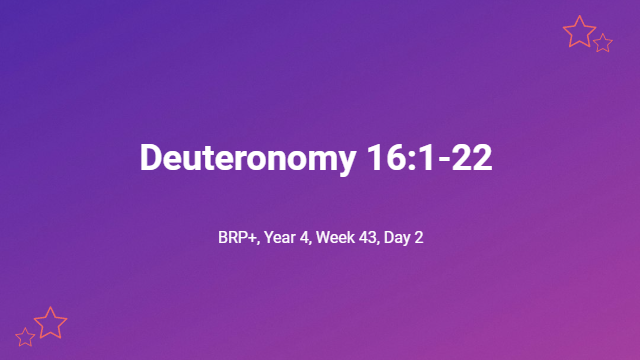Deuteronomy 16:1-22
Q.1. What would change in the celebration of the Passover in the Promised Land? Why was the Passover to be celebrated? – (Dt.16:1-8 c.f. Ex.12:3-4)
The original Passover was celebrated among the families of the Hebrews. However, Moses foreshadowed a change of location from their houses to – … the place where the Lord your God chooses to establish His name, you shall sacrifice the Passover in the evening at sunset, at the time that you came out of Egypt (Dt.16:6 c.f. 16:2, 7). The Passover was established so that Israel would never forget their deliverance from slavery – “Observe the month of Abib and celebrate the Passover to the Lord your God, for in the month of Abib the Lord your God brought you out of Egypt by night (Dt.16:1).
Q.2. What was the point of the Feast of Weeks i.e. Pentecost? How is it’s character preserved in the New Testament Day of Pentecost? – (Dt.16:9-12; Acts 2:1, 39-41)
God had promised to bring Israel abundance in the Promised Land, as long as they were obedient. Therefore, it was appropriate for the nation to remember God’s goodness when those harvests came, because they were a fulfilment of His promise. The Feast of Weeks (also known as Pentecost because it was fifty days after the Passover) was a harvest celebration, as was the New Testament Day of Pentecost. It marked the day when God, the Holy Spirit came forever to indwell believers. Their witness was transformed from that day forward (Acts 1:8), and a harvest of souls was added to the infant church (Acts 2:41).
Q.3. What impact would the Feast of Booths have on the nation? Why were all the males commanded to meet before the Lord? – (Dt.16:13-17 c.f. 1 Cor.11:3)
The Feast of Booths or shelters was attached to the Harvest Festival that began a week earlier. It was a fun time, with family reunions and then a special time when parents, grandparents, and children slept in leafy tents under the stars. It had an inbuilt generosity, as families shared with the less fortunate – and you shall rejoice in your feast, you and your son and your daughter and your male and female servants and the Levite and the stranger and the orphan and the widow who are in your towns (Dt.16:14). All members of the family were to join in these key feasts. For the head of the families of Israel, it was obligatory. It was their role to see that the commandments were kept through their own example – “Three times in a year all your males shall appear before the Lord your God in the place which He chooses, at the Feast of Unleavened Bread and at the Feast of Weeks and at the Feast of Booths, and they shall not appear before the Lord empty-handed (Dt.16:16).
Q.4. What requirement was Israel to comply with, in order to be guaranteed tenure of the Promised Land? How did the quality of leadership reflect upon God? – (Dt.16:18-22)
Justice was foundational to the inter-personal relationships of Israel. The leaders had a clear brief – You shall not distort justice; you shall not be partial, and you shall not take a bribe, for a bribe blinds the eyes of the wise and perverts the words of the righteous (Dt.16:19). There is little safety in countries that depart from the righteous judgment that has been undergirded by the laws of the Judeo-Christian ethics. The more they are eroded, the more safety and security diminish. For Israel, there were consequences for distorting justice, because it was an affront to God, Who is holy, righteous, and just in all His ways.

